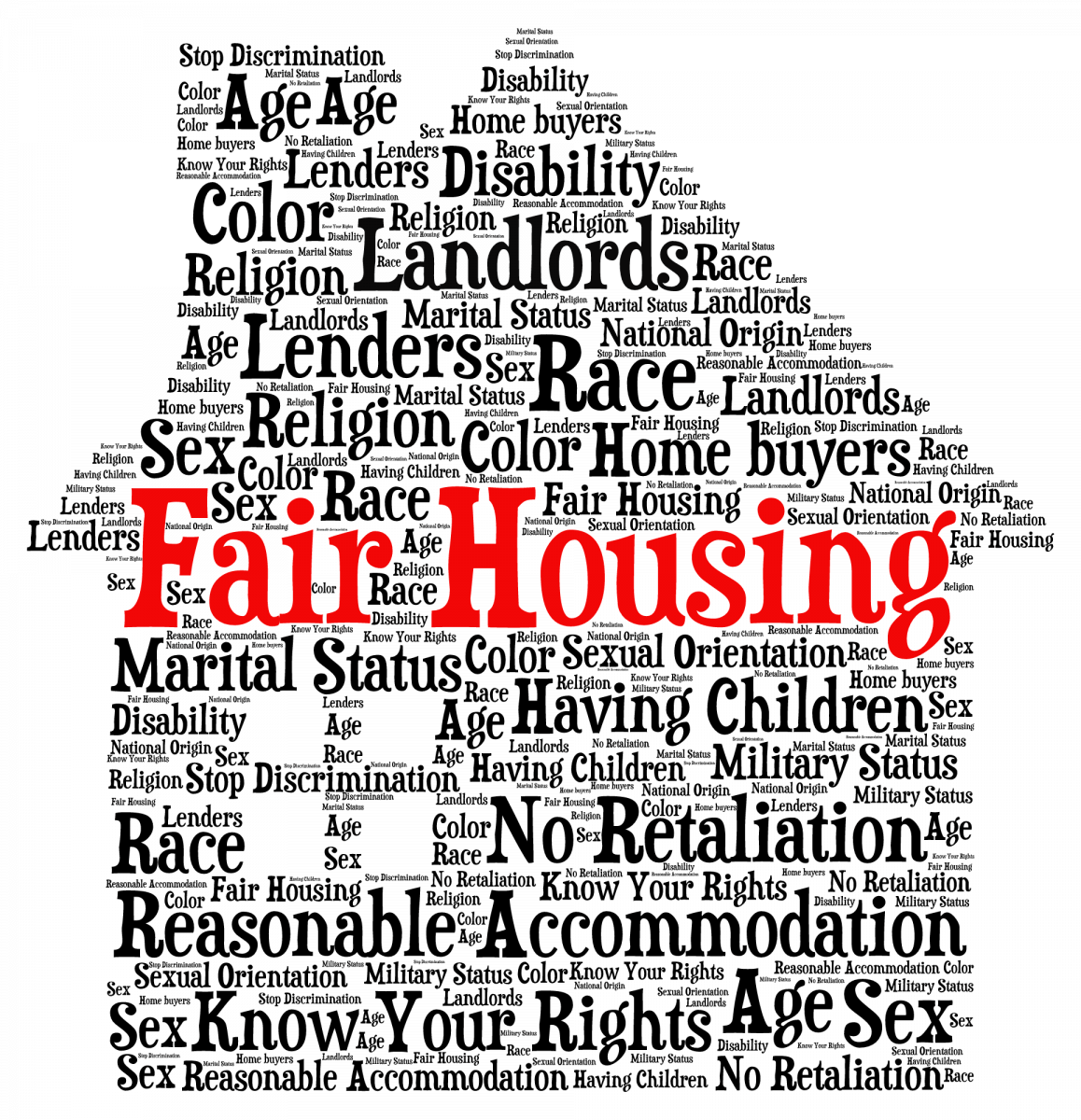
April is Fair Housing Month. Some housing providers are not in a celebratory mood as they face lawsuits or shake downs.
![]()
Every month, there is some cause, event or group to commemorate, celebrate, or raise awareness for.
Alongside autism, poetry, and mother earth , April also happens to be Fair Housing Month and for many owners, this is more than ceremonial. They are being sued or blackmailed for any scent of discrimination.
In recent headlines, a Burlingame building owner allegedly pressured a family to move into a bigger and more expensive unit because the tenant was expecting her second child. Alleged statements like the unit "is not for a family of your size" and that "families are known to cause more wear and tear" did not sit well with HUD.
Also in recent memory, apartment owners reached a $3 million settlement with the state of California after ownership and management prohibited all activities on the property and required parents to supervise children under the age 14 in common areas or risk eviction. The California Civil Rights Division took exception with these unlawful limits on children enjoying their homes.
While some acts of discrimination are blatant and are plastered in the news, what you don't see are countless acts of settlements or "shake downs" that are brokered behind the scenes.

Sometimes claims are frivolous and case in point: a listing agent showed an apartment to a gentleman in a wheelchair. They exchanged pleasantries, and the prospective tenant took a tour. By all accounts, it was an uneventful and standard showing.
When the rental applicant fell in love with the apartment and insisted on moving in, the tenant screening process identified poor credit and a judgment for hundreds of thousands of dollars.
After learning his application was denied, the prospective tenant claimed that he was discriminated against in a wheelchair and because of his religion. Totally bogus claims. It was clearly stated in the MLS that the rental unit was "handicapped accessible" and in fact, had a ramp for wheel chair access, wide doorways, bathroom modifications, and so forth. The applicant's religion, moreover, was unknown.
One of the first things out of the mouths of investigators was, "are you willing to settle?" Adamant that she did nothing wrong, the real estate agent's response was no. Investigators said that barring a settlement, all of her office files would be audited for evidence of discrimination, and made good on this promise by seeking out a pattern of excluding rental applicants.
The bloodhound found an instance where the landlord/agent accepted a tenant with a stain on her credit - a disputed phone bill on her credit report for around $120. Was giving the keys to this particular tenant proof positive that tenant screening standards were applied unevenly? It's apples and oranges.
The successful rental applicant in this case had excellent credit despite the contested phone bill. Since the renter survived the screening process after a hundred dollar phone bill, investigators maintained, the landlord and their agent should have welcomed in the handicapped gentleman who had a six-figure judgment and poor credit.
The landlord and their agent were vindicated, but not before much aggravation and thousands of dollars in legal fees.
Some attorneys feed their families by catching housing providers in a gotcha moment.
We've all heard the term of "ambulance chasers," and while we normally associate this label with personal injury lawyers, there are in fact attorneys actively trying to trap landlords and property managers in the act of improperly turning down a rental application.
We've all heard the term of "ambulance chasers," and while we normally associate this label with personal injury lawyers, there are in fact attorneys actively trying to trap landlords and property managers in the act of improperly turning down a rental application.

Possible defenses to a housing discrimination lawsuit
Aside from arguing "it didn't happen" - the plaintiff's claim is meritless and lacks factual or legal basis - here are some other considerations.
1) Is the tenant or prospective tenant a serial litigator? If he or she brings many unmeritorious complaints or has the propensity to relitigate the same matter, we can argue that they lack credibility. In fact, the Judicial Council has a term for this - a "Vexatious Litigant List" - and maintains a database updated monthly and is accessible to anyone.
2) Does the aggrieved party have a landlord tenant relationship? Oftentimes, a litigant will claim that he or she has a disability that entitles him or her to a "reasonable accommodation". Yet if there is no right of possession, such a claim may be unfounded under California Fair Housing Act [42 U.S.C. 3601 and seq.].
3) Was a more suitable rental candidate found? If an aggrieved rental applicant cries foul when their rental application is denied and claim that it was denied because of their reasonable accommodation request (for example to have an assistance animal during their occupancy), the defendant landlord can show that the tenant who was selected was a better candidate and provide proof of why the successful rental applicant is more worthy of the tenancy such as a better credit history for example. In other words, there was no discriminatory intent.
4) Would making a reasonable accommodation create an undue hardship on the housing provider? This is really a balancing act between the plaintiff's need for the accommodation and the defendant's ability to provide it.
Some factors that may be considered in this analysis include the cost of the accommodation, the impact on the operation of the defendant's business, and the availability of alternative accommodations. It's important to note that the defendant must show that providing the accommodation would create a significant difficulty or expense, not just some inconvenience or minor expense. In addition, the defendant must have explored and exhausted all possible alternatives before claiming undue hardship.
For example, a landlord may argue that accommodating a tenant's request to install a wheelchair ramp would be an undue hardship because it would require significant structural changes to the building and cost a significant amount of money. However, if there are reasonable alternatives, such as providing a first-floor unit or using a portable ramp, the landlord may not be able to claim undue hardship.
While undue hardship can be a defense to a housing discrimination lawsuit, it is a high bar to meet. Defendants should carefully consider all possible alternatives before claiming undue hardship and be prepared to demonstrate that the accommodation would cause a significant difficulty or expense.
5) When did the alleged act of discrimination occur? We need to put a finger on the statute of limitations.
6) Reasonable accommodation refused: The defendant landlord can argue that a reasonable accommodation was in fact offered to the plaintiff but was refused or rejected.
7) Legitimate business reason: The landlord embroiled in a discrimination claim can submit that there was a legitimate reason to turn down the tenancy - the denial was based on financial or practical considerations and there was no discriminatory intent. For example, the tenant has a documented history of damaging properties or paying rent late.
That's a little bit of a window into what we think about whenever a discriminatory action comes across our desks. This list is not exhaustive and of course, each case is different. If you find yourself in a jam, it's imperative to contact Bornstein Law.
However, we believe in working ourselves out of a job and our strong preference is to educate the rental housing community about "do's" and "don'ts" in order to avoid a costly and stressful lawsuit altogether.

Parting thoughts
There is an alphabet soup of federal and state fair housing laws and while some acts of discrimination are hateful and shock the conscious, most violations are simply due to carelessness by expressing a preference for a certain group at the exclusion of others.
We welcome all applicants, we make reasonable accommodations when able, and understand that when vetting prospective tenants, less communication is more.
Training is key for all agents and employees, and especially for whomever is the first point of contact when an apartment shopper inquires about an advertised rental.
